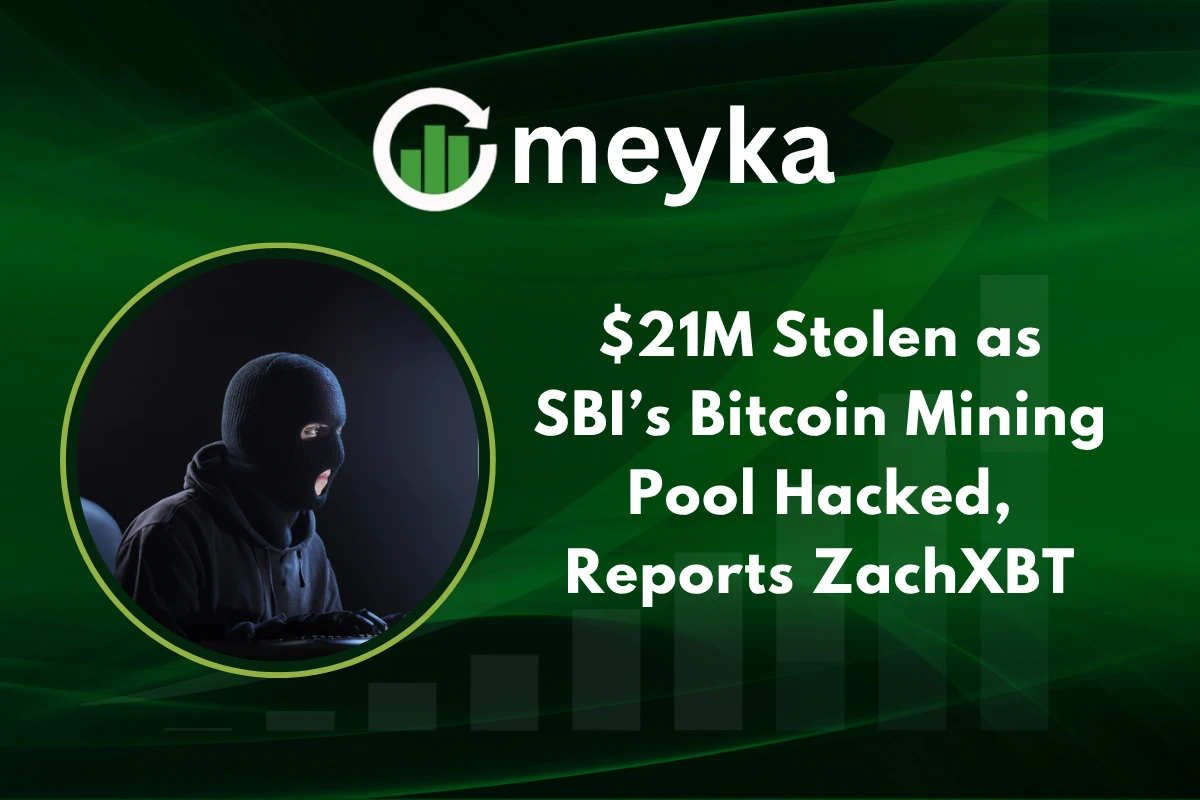$21M Stolen as SBI’s Bitcoin Mining Pool Hacked, Reports ZachXBT
A major security alarm fired in crypto land this week. A Mining Pool Hacked incident appears to have drained about $21 million from wallet addresses linked to SBI Crypto, the mining business of Japan’s SBI Group.
The breach was first flagged by blockchain sleuth ZachXBT, who traced suspicious outflows and a laundering path through Tornado Cash. The findings raised immediate suspicions of a state-backed operation.
Mining Pool Hacked: How the Incident Happened
On September 24, wallets tied to SBI Crypto recorded unusual transfers across several chains. Bitcoin, Ethereum, Litecoin, Dogecoin and Bitcoin Cash were among assets moved. The funds then flowed through instant exchange services and into the Tornado Cash mixer.
ZachXBT posted a chain analysis that highlighted the timing and the pattern of transfers. Blockchain trackers flagged about $21 million in total value.
Why does this matter? Mining pools like SBI play a key role in validating blocks. A breach exposes not only funds but also trust in custodial and operational security.
Mining Pool Hacked: Who Is Behind the Attack?
Investigators pointed to tactics familiar from past North Korea-linked operations. Analysts say the laundering route and the way funds were structured share hallmarks with the Lazarus Group.
Several outlets reported that the attack methods resemble prior DPRK cyber campaigns that target crypto liquidity to skirt sanctions. Authorities and firms are watching for more evidence, but the pattern is concerning
Are North Korea-linked groups often involved in crypto thefts? Yes. Security researchers have repeatedly connected large crypto heists to state-sponsored groups that use mixers and quick swaps to hide traces.
Mining Pool Hacked: Financial Impact
The immediate loss is about $21 million in mixed tokens. That is small compared with billion-dollar hacks, yet significant for a mining pool with ties to a traditional finance group.
SBI Crypto has not publicly confirmed the exploit in detail, and the company’s response remains closely watched. Markets reacted briefly, and crypto forensic teams dove into tracing the funds.
Which coins were stolen? Reportedly BTC, ETH, LTC, DOGE, and BCH were among the tokens moved from the affected addresses.
Mining Pool Hacked: Why Mining Pools Are Targeted
Mining pools hold significant on-chain balances and manage payouts across many wallets. That makes them attractive targets. Vulnerabilities can appear in operational key management, hot wallet guardrails, third-party services, or human processes such as social engineering.
Attackers target the weakest link, then move funds through mixers and instant exchanges to obfuscate origins. The SBI incident follows this textbook playbook.
Mining Pool Hacked: Security Lessons and Responses
Security teams say this shows the need for layered safeguards. Pools and exchanges should tighten custody controls, adopt multi-sig and hardware security modules, and run continuous on-chain monitoring.
Blockchain forensics firms can trace flows, freeze funds where possible, and provide leads for law enforcement. Several researchers credited by news outlets said rapid tracing helped map the laundering path to Tornado Cash.
Can stolen crypto be recovered?
Recovery is difficult when funds enter mixers like Tornado Cash and then cross into jurisdictions with weak controls. However, forensic tracing sometimes leads to frozen accounts or seizures if attackers move funds to centralized exchanges under regulatory scrutiny.
Mining Pool Hacked: Global Implications
This attack adds to a long list of incidents that show evolving state-backed cyber operations in the crypto space. If the Lazarus Group or similar actors are confirmed, it underscores geopolitical risks tied to digital assets.
Regulators and exchanges may face renewed pressure to tighten AML controls and to target mixers and instant swap services used for laundering. The incident could accelerate policy moves and stricter countermeasures worldwide.
Mining Pool Hacked: Community and Market Reaction
Blockchain sleuths and security firms rapidly amplified ZachXBT’s findings. Crypto communities watched the on-chain trails and discussed whether SBI’s operational model needs urgent change.
Tweets and Telegram posts from researchers and analysts circulated hot links to the traced flows. Major crypto outlets and exchanges reposted summaries while urging calm until official statements arrive.
Mining Pool Hacked: What SBI and the Industry Can Do Now
Experts recommend immediate steps: confirm the breach publicly, isolate affected keys and wallets, engage third-party forensics, and coordinate with exchanges and regulators to freeze funds where possible. Clear communication helps limit reputational damage.
Long-term, pools may move more funds into cold storage, increase use of multi-signature setups, and implement continuous red-team testing to find gaps.
Will mining pools change how they manage funds after this? Expect reforms. Many operators will treat on-chain balances as high-risk and tighten custody and payout processes. This event will push the industry to harden defences.
Mining Pool Hacked: The Path Ahead for Law Enforcement and Policy
Law enforcement cooperation will be crucial. When funds cross multiple chains and mixers, investigations need cross-border coordination. Policymakers may respond by targeting mixers or tightening KYC/AML rules for instant exchanges.
The case will test the balance between privacy tools and illicit finance risks. For investors, the key signals are transparency and quick remediation from the affected pool.
Conclusion: What To Watch Next
The Mining Pool Hacked event at SBI Crypto is a reminder that crypto infrastructure touches both modern fintech and old geopolitical tensions. Watch for three things: official confirmation and explanation from SBI, any law enforcement action or asset freezes, and additional on-chain evidence linking the theft to known threat actors.
The $21 million loss may be modest in crypto terms, but it matters for confidence, regulation, and how institutional-like crypto services secure customer assets moving forward.
Disclaimer
This is for information only, not financial advice. Always do your research.






